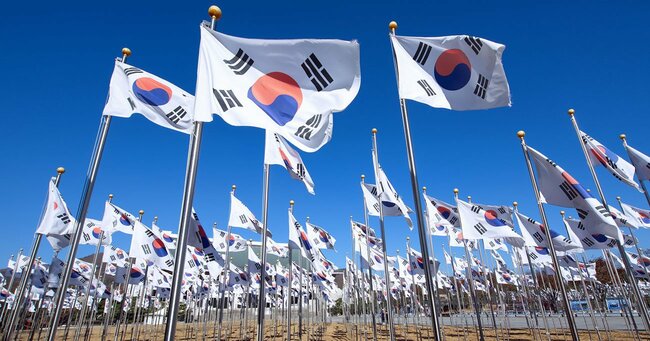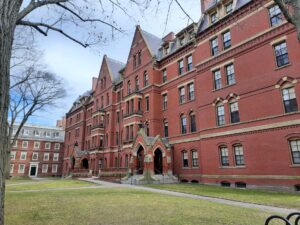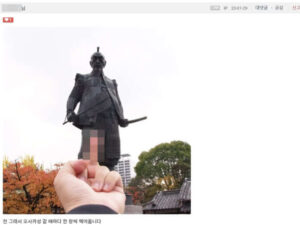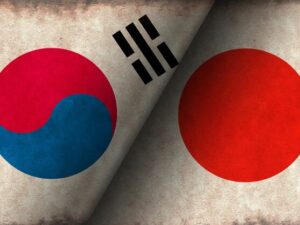Miran Tanaka: Writer in Korea
International/Chinese News&Analysis
Prayers were offered in various parts of Japan this summer, marking the eighth anniversary of the end of the war. On the other hand, August 15 in South Korea is a national holiday called “Kwangbokjeol,” which marks the liberation of the country from Japanese colonial rule, and is an official holiday. In Korea, this day is highly valued, and it is said to be a “day of shrinking shoulders” for Japanese living in Korea. However, since the change of government last year that brought Yun Suk-yeol to the presidency, Japan-Korea relations have rapidly improved, and the situation has turned around with the Japan boom ignited mainly by the young people known as the “Generation Z.” This year’s Gwangboksetsusi holiday is the first time that the traditional holiday is celebrated on this day. This year’s Kwangbokjeol (the Korean New Year) was marked by events that would have been unthinkable in the past. (By Miran Tanaka, writer living in South Korea)
Gwangbokjeol,” which has been renewed since the days of the Moon Jae-in administration
This year marked the second Gwangbokjeol Festival under the Yun administration. At the commemorative ceremony, President Yun emphasized the improvement of Japan-South Korea relations and the strengthening of trilateral cooperation with the U.S. to counter the North Korean threat. This was in stark contrast to the “anti-Japan” stance of the previous administration of Moon Jae-in, which was far calmer than the “NO JAPAN” campaign that began at this time four years ago.
Also, on the day of August 15, there were usually many special programs related to Kwangbokjeol on terrestrial broadcasting, but these have been decreasing year by year, with the exception of KBS, the state-run broadcaster, and this trend has been even more pronounced since the change of government.
These changes were also reflected in the public opinion polls with surprising and surprising results.
One in Four Gen Z Koreans “Never Heard of Kwangbokjeol”
The results of a public opinion poll in South Korea are attracting attention. As Yonhap News reported on August 14, a data consulting firm conducted a survey of people in their teens to 60s on the occasion of Gwangbokseol, and the results revealed some interesting findings regarding “awareness of Gwangbokseol.
The survey asked, “Do you know the meaning, events, year and date of Kwangboksan?” 83.4% of all respondents answered “Yes” to this question. By age group, respondents in their 60s were the most familiar with the festival, with 51% saying they were very familiar with it. This was followed by 32.3% of those in their 40s and 50s, 26.4% of those in their 30s, and 21.9% of those in their 10s and 20s, with the percentage decreasing as the age group decreased.
Even more noteworthy was the “don’t know” response. In particular, looking only at the responses of Generation Z (born between 1995 and 2009), a total of 27% of them answered either “don’t know at all” (11.2%) or “don’t know much” (15.6%) about “Kwangbokjeol”. 27% means that one out of four of Generation Z answered “don’t know much” about Kwangbokjeol. This is not such a high number for Japanese. To the Japanese, this may not seem like such a high number. Nevertheless, there is a reason why this result is surprising.
As you know, South Korea is a country that puts much more effort into history education than Japan. From early childhood, history education is given from time to time, and the content is thoroughly anti-Japanese. Kwangbokjeol, the day Korea was liberated from Japan, is a major and glorious topic in modern history. Despite this, the fact that nearly 30% of young Koreans answered that they do not know or understand Kwangbokjeol is very shocking to them.
In Korea, the flying of the national flag is encouraged on all public holidays, including Kwangbokseol. Hooks are attached to the front door of houses and to the balcony of apartments (large condominiums in Japan) where the national flag can be flown. It is surprising from the Japanese point of view that every household is supposed to have its own national flag, but even in Korea, the number of households flying the national flag has been decreasing, and only a few flags were seen on this year’s Kwangbokjeol (Korean New Year’s Eve). This is another reason why I sense a change in the perception of “Kwangbokjeol”.
In addition to the “I don’t know much about Gwangbokseol,” another item, “How to spend the day of Gwangbokseol,” also attracted attention. About 29.5% of the respondents answered that “it is up to the individual to travel to Japan (on Kwangbokseol),” with Generation Z having the highest percentage (32.6%).
Entertainers are also asked to set an example of patriotism.
Enjoying a trip to Japan is also becoming a free activity.
In this context, actress Koh So-yeon (born in 1972, age 50) caught our attention when she posted on SNS about her family trip to Japan during this period. Koh So-yeon’s husband is Jang Dong-gun, the original Hallyu star, and they are known as a loving couple in Korea.
Riding the wave of the recent Japan boom, an increasing number of Koreans are posting about their trips to Japan on SNS. Her posts are not unusual in this sense, but the reason they attracted attention this time was because the timing of their trip coincided with the Kwangbokjeol Festival. In response to the comments and reports pointing this out, she issued an apology on SNS, saying that she had not given enough consideration to the timing of her trip.
In Korea, entertainers in particular are expected to be role models of “patriotism,” and one senses that this has become a tacit understanding. For example, actor Hyun Bin (born in 1982, age 40) volunteered for military service in the Marines, fulfilling a tough duty, and was praised as a “patriot paragon,” and it is well known in Japan that his popularity has increased even further.
The same is true for other entertainers who are expected to behave as patriots. This is the reason why many celebrities’ posts on the occasion of Kwangbokjeol Day show their loyalty to the country, such as uploading the Korean national flag, the Taegeuk flag.
Even today, information spreads quickly through social networking services, and statements are often cut out and conveyed in a way that differs from the original intent. One wonders how hard it must be for celebrities, whose words and actions are constantly scrutinized by the public as if they are supposed to be “patriotic.
The flight from Korea to Japan on August 15 was fully booked.
In fact, Koh’s SNS did not seem to be “flooded with critical comments” as reported, but rather, it seemed to be a reflection of the celebrity tax that comes with being a celebrity.
A friend of mine who went to Japan on the day of Kwangbokyong told me that the plane was fully booked. I do not think that the public is actually that critical of Koh So-yeon’s trip to Japan, and as the aforementioned survey indicated, “I don’t care if she went to Japan on Kwanbok Festival,” is probably the true sentiment among young Koreans.
After all, seeing that individualism is becoming more prevalent, especially among Generation Z, one can sense an attitude that “patriotism and how to spend Kwangboksai should not be forced or dictated by anyone,” and this attitude is likely to spread in the future. Although Japan-Korea relations have been improving recently, we still cannot let our guard down. If a leftist government wins again in the next presidential election, it is easy to imagine that the “United Democratic Party of Korea” and its fringe civic groups will once again try to destroy Japan-Korea relations as they did during the previous Moon administration.
However, considering that many people are fed up with being denied and coerced by the government to express their desires and feelings of “wanting to travel to Japan” and “liking Japan,” and that the previous administration’s clampdown did not last long after all, it is conceivable that gaining public support with anti-Japanese stories may already be at its limit. We hope that the Korean people will remember this and reflect the people’s will in the general election next spring, and then in the presidential election four years from now.








